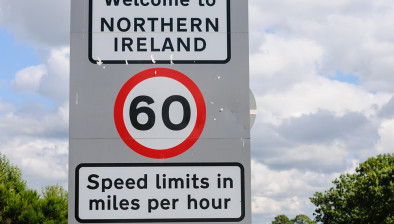NI: Court of Appeal: Flying of Union Flag at government buildings and courthouses does not offend parity of esteem
A woman who objected to the Union Flag being flown at Omagh Courthouse on prescribed days has lost her appeal against the decision that the legislation did not breach the guarantee of parity of esteem under the Good Friday Agreement.

About this case:
- Judgment:
- Court:Court of Appeal
- Judge:Lord Justice Horner
Concluding that the legislation was not discriminatory, Mr Justice Mark Horner said the flying of the Union Flag simply reflected the constitutional position of Northern Ireland as part of the UK.
Legislative Framework
In April 2010, the words “and courthouses” were added to Article 3 of the Flags (Northern Ireland) Order 2000.
Regulation 2 of the Flags Regulations (Northern Ireland) 2000 provides that the Union Flag shall be flown at the government buildings listed in the Regulations and at all courthouses on specified days – presently 15 days each year.
In re Murphy’s Application for Judicial Review [2001] NI 425
In 2001, Conor Murphy MLA, applied for a judicial review of the decisions of the Secretary of State for Northern Ireland in relation to the enactment of the 2000 Order and Regulations, arguing that they discriminated against those opposed to the flying of the Union Flag, and that the decision was inconsistent with sections 75 and 76 of the Northern Ireland Act 1998
Mr Justice Brian Kerr (as he then was) disagreed, and held that the making of the Flags Regulations (Northern Ireland) 2000 and the requirement that the Union Flag be flown on government buildings was not designed to favour one tradition over another – “it merely reflects Northern Ireland’s constitutional position as part of the United Kingdom”.
Concluding that the Flags Regulations (Northern Ireland) 2000 were not in conflict with the Belfast/Good Friday Agreement, Mr Justice Kerr said that by confining the days on which the Union Flag is flown, the Secretary of State sought to strike the correct balance between acknowledging Northern Ireland’s constitutional position and not giving offence to those opposed to it.
Mr Justice Kerr said this approach exemplified a proper regard for “partnership, equality and mutual respect” and fulfilled the Government’s undertaking that its jurisdiction in Northern Ireland “shall be exercised with rigorous impartiality on behalf of all the people in the diversity of their identities and traditions”.
McMahon’s Application [2018] NIQB 74
In the High Court in October 2018, Helen McMahon complained that in Murphy, only one aspect of Article 1(v) of the Multi-Party Agreement was examined, namely individual rights, and that the judgment did not address the wider aspirations of both communities. Mrs Justice Siobhan Keegan considered that the core point made by Ms McMahon was that Article 1(v) should be separated into two distinct principles:
- An obligation to exercise with rigorous impartiality on behalf of all people in their diversity and traditions; and
- That the power being exercised shall be founded on the principles of full respect for, and equality of, civil, political, society and cultural rights, of freedom from discrimination for all citizens, and of parity of esteem and of just and equal treatment for the identity, ethos and aspirations of both communities.
Mrs Justice Keegan said she was not convinced that Mr Justice Kerr had restricted his consideration of this issue to individual rights, “it was artificial to disaggregate parity of esteem as a separate consideration or principle from the overriding objective contained in Article 1(v)”. she said that it read as one paragraph and it was unhelpful to interpret it in any other way.
Concluding that it was abundantly clear that the Secretary of State had fulfilled his obligation to have regard to the principles contained in the Belfast/Good Friday Agreement in conducting a balancing exercise, Mrs Justice Keegan said the Regulations could not be said to be unlawful and dismissed the application.
Court of Appeal
Delivering the judgment of the Court of Appeal, Mr Justice Mark Horner noted that Article 4(4) of the 2000 Order provides that in exercising his powers to make Regulations on the flying of flags, the Secretary of State must “have regard to the Belfast Agreement”.
Mr Justice Horner said it was clear from excerpts from Hansard that the Secretary of State did have regard to the views of both communities without in any way affording one community preferential treatment. Mr Justice Horner said he was satisfied that the Secretary of State did have regard to the Belfast Agreement in making the 2000 Regulations and that the decisions he took were not intended to “disrespect” those members of the population who do not consider the Union Flag to reflect their identity and aspirations and that they should not be perceived as such.
Mr Justice Horner further agreed with Mrs Justice Keegan’s conclusions about the disaggregation of Article 1(v) and said that the concept of parity of esteem is not defined in the Agreement, but comes within the broad principles of equality, fairness and respect as applied to the two communities in Northern Ireland.
Dismissing the appeal, Mr Justice Horner said the flying of the flag on a small number of days over Omagh Courthouse did not disrespect Ms McMahon, her community, or any part of her community – and that it did not provide additional respect to the Unionist community or it’s members. He said it did not prefer one community over another, it did not hold one individual in higher esteem than another, it was not discriminatory – it simply reflected the constitutional position of NI as part of the UK.
- by Seosamh Gráinséir for Irish Legal News








